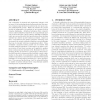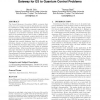97 search results - page 11 / 20 » The Evolutionary Control Methodology: An Overview |
ICAC
2009
IEEE
14 years 2 months ago
2009
IEEE
Increasingly, applications need to be able to self-reconfigure in response to changing requirements and environmental conditions. Autonomic computing has been proposed as a means...
ATAL
2010
Springer
13 years 8 months ago
2010
Springer
Multi-agent learning is a crucial method to control or find solutions for systems, in which more than one entity needs to be adaptive. In today's interconnected world, such s...
AAAI
2004
13 years 9 months ago
2004
We describe the problem of scheduling the television broadcasts of the U.S. National Football League (NFL). Unlike traditional round-robin tournament scheduling, the NFL problem i...
HYBRID
2010
Springer
14 years 2 months ago
2010
Springer
The complexity of physical and engineering systems, both in terms of the governing physical phenomena and the number of subprocesses involved, is mirrored in ever more complex mat...
GECCO
2007
Springer
14 years 1 months ago
2007
Springer
The Second Harmonic Generation (SHG), a process that turns out to be a good test case in the physics lab, can also be considered as a fairly simple theoretical test function for g...


